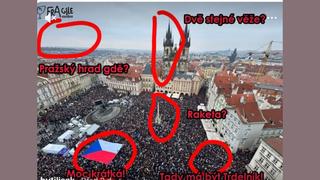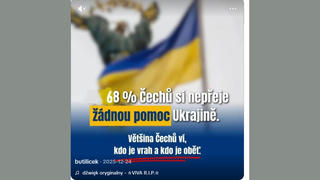

Has the European Union's policy of becoming carbon neutral by 2050, the Green Deal, caused the energy crisis that has led to a rise in prices in the European Union in recent years? No, that's not true: The European Union is facing an energy crisis because of the Russian invasion of Ukraine.
The claim appeared in a video (archived here) on TikTok on December 27, 2023. The person in the video comments on a Christmas speech by Czech Prime Minister Petr Fiala, saying it was full of "lies" and "half-truths" and adds (translated from Czech to English by Lead Stories staff):
Of course Fiala did not forget to blame the Russia/Ukraine war for the energy crisis, namely Putin. And of course he forgot to say that the real, main cause of the energy crisis is the Green Deal. The green destiny of the European Union, to which he personally committed us ...
This is what the post looked like on TikTok at the time of writing:

(Source: TikTok screenshot taken on Sun Dec 31 14:10:00 2023 UTC)
The main cause of the energy crisis in the European Union (EU) is Russia's aggression against Ukraine and the EU's subsequent efforts to reduce its dependence on Russia for gas and oil supplies. Part of the RePowerEU plan is to emphasize renewable energy as one of the ways to reduce dependence on Russian fossil fuels and end the energy market crisis. Blaming the EU's Green Deal for the energy crisis in Europe is part of the Russian narrative that Russian President Vladimir Putin has used in the past.
Following Russia's invasion of Ukraine, which began on February 24, 2022, the EU had to quickly reassess its relations with Russia, the EU's longstanding supplier of gas and oil. Putin used these supplies as a means of exerting pressure before and during the war and has repeatedly restricted supplies.
To ease the energy crisis, the EU has secured record supplies of liquefied natural gas (LNG) and increased supplies of pipeline gas from other sources, urged households and businesses to reduce demand and introduced new gas storage rules to ensure the storage is filled ahead of the winter season. However, these measures put a strain on Europe's outdated gas infrastructure, causing energy prices to rise in the 2022-23 season.
For the current winter of 2023-24, Europe is in a more comfortable position in terms of gas supply. This is due to high gas storage levels, lower energy prices and the EU's improved ability to transport alternative gas supplies from other sources, writes the Brussels-based think tank Bruegel in an analysis from October 10, 2023. The think tank also argues that the EU has focused on developing green energy, which has helped it to reduce its dependence on Russia.
Norway has replaced Russia as the EU's largest gas supplier, and an LNG terminal has been opened in the Netherlands; further facilities of this type are planned throughout Europe. Nevertheless, analysts believe that the European gas market will remain tight in the coming years.
Czech Prime Minister Petr Fiala gave a Christmas speech (archived here) on December 26, 2023, which is referred to in the video published on TikTok. Fiala cited the European energy crisis, inflation and the high numbers of refugees affecting the region as direct consequences of Russia's unlawful aggression against Ukraine.










